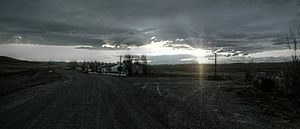Bajo Caracoles facts for kids
Quick facts for kids
Bajo Caracoles
|
|
|---|---|
|
Municipality and village
|
|

The skyline of Bajo Caracoles
|
|
| Country | |
| Province | Santa Cruz Province |
| Department | Lago Argentino Department |
| Elevation | 2,011 ft (613 m) |
| Climate | BSk |
Bajo Caracoles is a very small village and municipality located in the Santa Cruz Province in southern Argentina. It's a quiet place, known for being a stop along the famous Ruta 40, a long highway that runs through Argentina.
Contents
What is Bajo Caracoles?
Bajo Caracoles is more than just a dot on the map; it's a small community. It's officially recognized as both a village and a municipality. This means it has its own local government, even with its tiny size. The village is situated about 613 meters (2,011 feet) above sea level.
Where is Bajo Caracoles Located?
This small settlement is found in the vast and beautiful region of Patagonia. It lies on Ruta 40, which is one of the longest and most important roads in Argentina. The village is about 127 kilometers (79 miles) south of a town called Perito Moreno. It's also very close, just 3 kilometers (1.9 miles) south, to the road that leads to a famous historical site.
Life in Bajo Caracoles
Bajo Caracoles is one of the smallest communities you'll find. According to a census taken in 2001, only 31 people lived there. Imagine living in a place where everyone knows everyone! Life in such a small village is often very different from living in a big city. People usually rely on each other and the surrounding nature.
Nearby Wonders: Cueva de las Manos
One of the most exciting things about Bajo Caracoles is its closeness to a very special place called Cueva de las Manos, which means "Cave of the Hands." This cave is a UNESCO World Heritage Site, recognized for its incredible ancient art.
Ancient Art and History
The Cueva de las Manos is famous for its cave paintings, especially the many outlines of human hands. These paintings were made by early people who lived in the area thousands of years ago. Scientists believe some of the oldest paintings are about 9,000 to 10,000 years old! The artists used natural pigments to create these images, which also include pictures of animals like guanacos and hunting scenes. It's like a giant art gallery from the Stone Age.
Visiting the Cave
Many people who travel along Ruta 40 stop at Bajo Caracoles to visit the Cueva de las Manos. It's a chance to step back in time and see how ancient humans expressed themselves. The site helps us understand the history and culture of the first people who lived in Patagonia.
Climate and Nature
The area around Bajo Caracoles has a cold semi-arid climate. This means it's generally dry, with not much rainfall, and can get quite cold, especially in winter. The landscape is often open and vast, with unique plants and animals adapted to these conditions. You might see guanacos, rheas, and other Patagonian wildlife.
See also
In Spanish: Bajo Caracoles para niños
 | Precious Adams |
 | Lauren Anderson |
 | Janet Collins |

